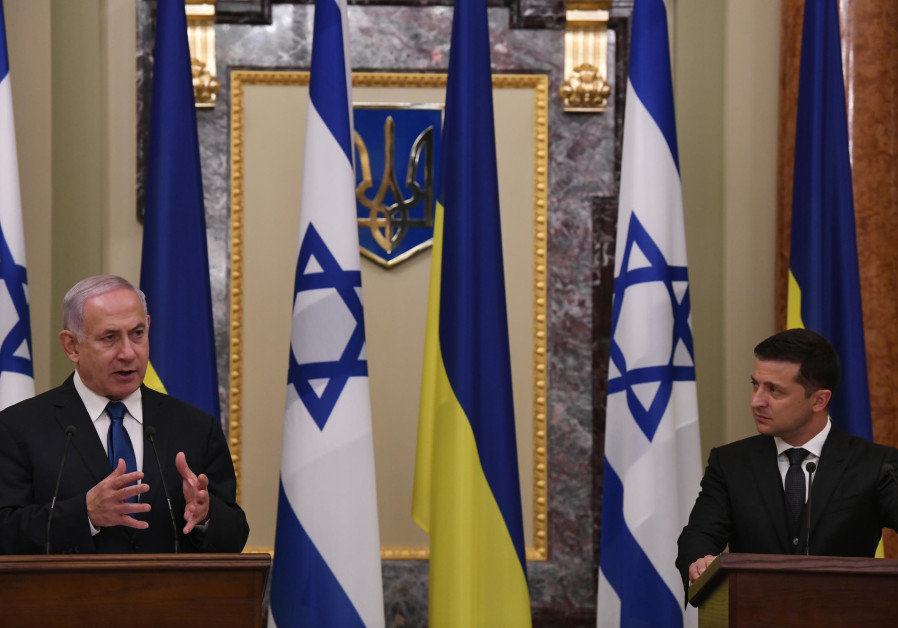Netanyahu in Ukraine: No more Babi Yars

Prime Minister Benjamin Netanyahu’s Statements with the President of Ukraine and the signing of agreements. (photo credit: AMOS BEN-GERSHOM/GPO)
Standing at Babi Yar, but with Iran obviously on his mind, Prime Minister Benjamin Netanyahu declared it is Israel’s “constant duty to stand against murderous ideologies in order to ensure that there will never be another Babi Yar.”
Netanyahu’s comments came at a memorial ceremony on Monday at the site, where some 34,000 Jews were murdered by the Nazis and Ukrainian collaborators in September 1941.
“For humanity, Babi Yar is a warning sign,” he said. “For Jews, it is an eternal imperative – we will always defend ourselves, by ourselves, against any enemy.”
Netanyahu, who arrived in Ukraine on Sunday for a two-day visit – the first by an Israeli prime minister in 20 years – said that it was hard to believe that “this beautiful forest saw the horror that happened here. The forest was silent, but so too was the world.”
The prime minister, accompanied at the ceremony by Ukrainian President Volodymyr Zelensky, noted that the horrible brutality in the forest did not take place on another planet.
“It took place just minutes from the bustling center of Kiev,” he said. “The massacre at Babi Yar by the Nazis and their collaborators paved the way for the murder of a million and a half Ukrainian Jews. It also preceded the final solution.”
Netanyahu praised Zelensky and the Ukrainian government for preserving the memory of the Holocaust, and for its continued efforts against antisemitism. He contrasted the state of the Jews then – when it was a people who wandered from place to place, only to be slaughtered – to the situation of the State of Israel today.
“From a helpless people that was slaughtered, we have become a strong and proud state,” he said.
Zelensky referenced Israel’s strength when, after meeting Netanyahu earlier in the day in the Presidential Palace, said his country has “something to learn from Israel, especially in security and defense, and we will of course be doing that.”
The Ukrainian president, who is Jewish and was voted into office in April, thanked Jerusalem for supporting its “sovereignty and territorial integrity” in its conflict with Russia in Crimea and eastern Ukraine.
Netanyahu, during his comments after the meeting, said that Kiev agreed to open a hi-tech and investment office in Jerusalem, and that Israel would also open a similar bureau in Kiev.
In opening an official office in Jerusalem, Ukraine is following the example of the Czech Republic and Australia, which have opened offices in Jerusalem, but kept their embassies in Tel Aviv.
While there is significant support in Ukraine’s parliament to move the embassy from Tel Aviv, this is considered highly unlikely because of the European Union’s fierce opposition to the move, and Ukraine’s need for European support and assistance in dealing with Moscow.
Netanyahu is in Kiev for a two-day trip that political opponents charge is little more than a photo opportunity before the September 17 election in an attempt to siphon Russian-speaking voters away from Avigdor Liberman’s Yisrael Beytenu Party.
Netanyahu made a point of mentioning during his comments that Zelensky said he would advance in parliament the ratification of a pension agreement, which would provide Ukrainian government pensions to some 8,000 Ukrainian seniors in Israel who immigrated after the country gained independence from the Soviet Union in 1991.
While Ukraine has agreed in principle to pay these pensions, the issue remains entangled in bureaucracy and has not yet been ratified by the Ukrainian parliament – partly because of funding issues.
Netanyahu’s state visit began Monday morning with a visit to the Tomb of the Unknown Soldier and a monument to the Holodomor – the famine in the Soviet Ukraine in 1932-1933 during which millions starved to death. Zelensky, during his statement, asked Netanyahu to recognize the Holodomor as a genocide.
Some Holocaust scholars in Israel, such as Efraim Zuroff of the Jerusalem office of the Simon Wiesenthal Center, have come out against such recognition, saying the Holodomor was the result of Joseph Stalin’s forced collectivization but was not aimed directly at Ukrainians. Others, however, disagree, saying that Stalin aimed to snuff out Ukrainian national aspirations.
Netanyahu’s official trip got off to a clumsy start when his wife, Sara, who was unfamiliar with the “korovai” ceremony, was caught on camera dropping a piece of bread that her husband handed to her after he was ceremoniously given the morsel by women in traditional dress who greeted them when they landed at Boryspil International Airport in Kiev.
Some in the Israeli media highlighted the incident and reported that the prime minister’s wife had thrown the bread to the ground. This was then picked up by some in the Ukrainian media as a sign of disrespect.
Netanyahu dismissed this as “complete nonsense” and told reporters that he raised the issue with the head of the Ukrainian president’s office, whom he quoted as saying, “it was clear that there was no intention of Mrs. Netanyahu to show disrespect to Ukraine.”
And Israeli Ambassador to Ukraine, Joel Lion, addressed the issue in a tweet: “Just talked with the Head of the President’s Office, Andreii Bohdan, he told me that the whole bread incident was clearly unintentional and unimportant, and certainly not media-worthy.”
`; document.getElementById(“linkPremium”).innerHTML = cont; (function (v, i){ });





Comments are closed.